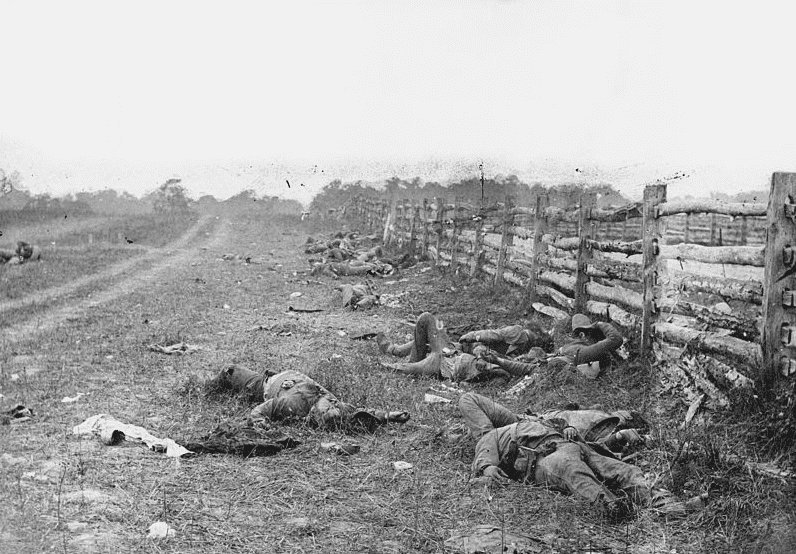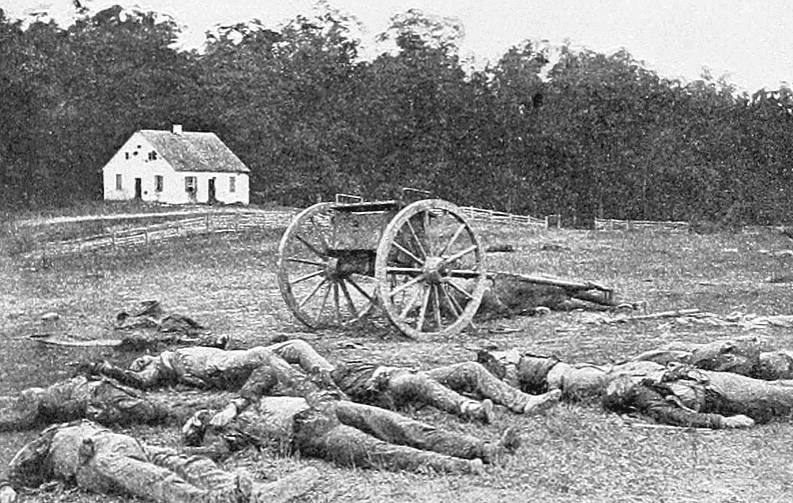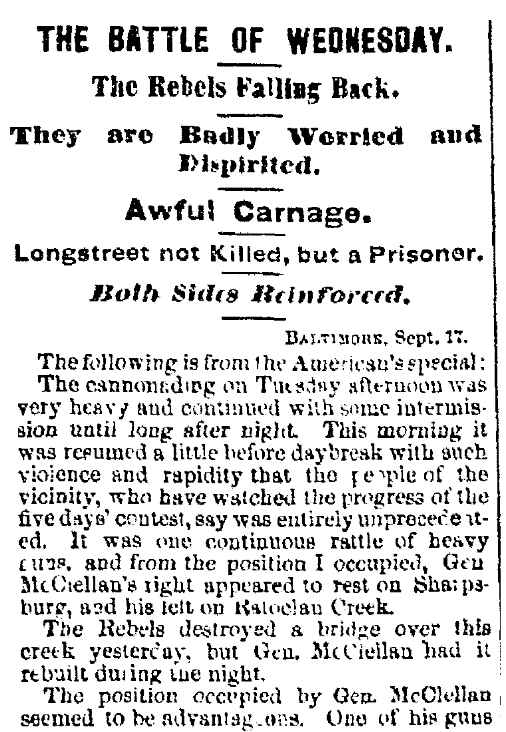The Civil War’s Battle of Antietam (or Sharpsburg), a fierce engagement fought near Sharpsburg, Maryland, on 17 September1862, was the bloodiest day in the military history of the United States. In a battle that raged twelve hours and saw numerous attacks and counterattacks, the two combined armies suffered nearly 23,000 casualties.

The battle was technically a draw, but when the smoke cleared Confederate General Robert E. Lee ended his northern invasion and ordered his Army of Northern Virginia back across the Potomac River to return to Virginia. Elated by Lee’s retreat, Union General George B. McClellan claimed his Army of the Potomac had gained a great victory.
President Abraham Lincoln saw it differently, however. He was dismayed that McClellan, despite outnumbering Lee by 2-1, failed to defeat the Confederate army. Even worse, he was furious that McClellan passively allowed Lee’s army to withdraw back to Virginia without following up and smashing the retreating enemy. Disgusted, Lincoln removed McClellan from command on November 7, and the two men became bitter rivals – with McClellan challenging Lincoln in the presidential election of 1864.

Although the Union suffered more casualties (12,401 to the Confederates’ 10,316) and the battle ended in a draw, the Battle of Antietam was a setback for the South, ending the momentum it had been building and affecting the outcome of the war in several ways.

The tide of the war had been turning in the Confederacy’s favor ever since the new Confederate commander, the clever and tenacious Lee, had driven McClellan’s huge 90,000-man Army of the Potomac away from the Confederate capital of Richmond during the Seven Days Battles the last week of June 1862. Lee followed that up with a resounding victory at the Second Battle of Bull Run (Manassas) on Aug. 28-30, and the South’s confidence grew.
Lee decided to seize the initiative and invade the North, but the Battle of Antietam ended that attempt. Equally important was the battle’s political impact. The North’s mood had been darkening and support for Lincoln waning, and the president desperately needed a Union victory on the battlefield.
Most significant of all, Lincoln wanted to announce the Emancipation Proclamation – but needed a victory so that the proclamation was not seen as an act of desperation. After the Battle of Antietam Lincoln felt emboldened, and on September 22 issued the proclamation, due to go into effect 1 January 1863, freeing the Confederacy’s slaves and ensuring that Great Britain and France would refrain from recognizing the Confederate States of America.
The following newspaper article was one of the earliest reports to reach anxious readers in the North. (The article incorrectly states that Confederate General James Longstreet was wounded and captured.)

Here is a transcription of this article:
THE BATTLE OF WEDNESDAY.
The Rebels Falling Back.
They Are Badly Worried and Dispirited.
Awful Carnage.
Longstreet Not Killed, but a Prisoner.
Both Sides Reinforced.
Baltimore, Sept. 17.
The following is from the American’s special:
The cannonading on Tuesday afternoon was very heavy and continued with some intermission until long after night. This morning it was resumed a little before daybreak with such violence and rapidity that the people of the vicinity, who have watched the progress of the five days’ contest, say was entirely unprecedented. It was one continuous rattle of heavy guns, and from the position I occupied, Gen. McClellan’s right appeared to rest on Sharpsburg, and his left on Raloclan Creek.
The Rebels destroyed a bridge over this creek yesterday, but Gen. McClellan had it rebuilt during the night.
The position occupied by Gen. McClellan seemed to be advantageous. One of his guns seemed to be stationed on a range of hills, from the apex of which the little white clouds of smoke rolled up in the distance, marking distinctly the line of conflict.
The reports were so rapid as to be without intermission, and sometimes three or four reports would strike the ear at the same moment. This cannonading was at daylight, and was heard distinctly up to one o’clock, causing the impression that the great battle of the campaign was in progress.
The wounded were being carried towards Hagerstown and Boonsboro, so that little could be heard directly from the field in the direction of Middleton. Those reports that were received, however, were highly favorable, our forces having at the time the best position and the battle being principally with artillery, in which we have great superiority.
Soldiers who were on the field during Tuesday state that it consisted entirely of artillery. It commenced early in the morning and continued till late at night, McClellan having, at the close of the day, driven them about half a mile, and obtained an elevated position, from which he was operating today.
The fight of yesterday was, however, sharply contested by the enemy, and it was only at the close of the day that the slight advantage was gained.
It is evident that Gen. McClellan was pressing Gen. Lee to the river in such a manner that his army cannot much longer sustain itself, unless relieved from the other side. Its re-crossing in the face of such a determined pressure is simply impossible, and the events of today and tomorrow are likely to indicate the success or total failure of the campaign.
Harrisburg, Pa., Sept. 17, 1862.
In the battle today, our right wing rested on Sharpsburg and our left this side of Anticum Creek, near Porterstown. The Rebels are falling back on Harper’s Ferry, much worried and dispirited.
The wounded are arriving at Hagerstown.
The bridge reported destroyed by the Federal forces, was the canal bridge at or near Williamsport. The destruction of this bridge is of great importance, as it impedes the Rebels from bringing up supplies.
The great battle has been fought and we are victorious. The carnage on both sides was awful. Gen. Longstreet was wounded and taken prisoner.
10 p.m. – Dispatches just received at headquarters, from Hagerstown, say we have achieved a glorious victory.
Longstreet is not killed, but is wounded and a prisoner.
Gen. Hooker was wounded in the foot.
No particulars are received.
(Special to the New York Herald.)
Harrisburg, Sept. 17, 1862 – Evening.
Reports just come in here state that the whole Rebel army has been driven this way, and are retreating to Hagerstown.
Longstreet is reported captured, and D. L. Hill killed. 10,000 Pennsylvania Militia will meet the foe at Hagerstown, to invade Pennsylvania backwards.
A severe engagement occurred yesterday between our army and the Rebels near Sharpsburg, in which the enemy were well thrashed, with terrible slaughter. Five hundred of their dead were buried by us as early as 8 o’clock a.m. today, and the work was still going on. This morning the battle recommenced at 5 o’clock…
Jackson joined Lee’s forces at Antietam Creek, while our forces were reinforced by 30,000 men from Washington. Jackson’s reinforcements to Lee are reported at 40,000.
Up to my last advices, victory illuminated our standards, and the impression prevailed at Hagerstown, that the whole Rebel army of Virginia is annihilated.
Confidence prevails here and enthusiastic admiration of McClellan and the army. We have undoubtedly won great and decisive victories, both yesterday and today.
All the facts I previously telegraphed you have not, however, been fully confirmed up to this moment.
Among our trophies are whole batteries and thousands of small arms and prisoners. The rebellion is virtually subdued.
Note: An online collection of newspapers, such as GenealogyBank’s Historical Newspaper Archives, is not only a great way to learn about the lives of your ancestors – the old newspaper articles also help you understand American history and the times your ancestors lived in, and the news they talked about and read in their local papers. Did any of your ancestors serve in the Civil War? Please share your stories with us in the comments section.
Related Articles:
